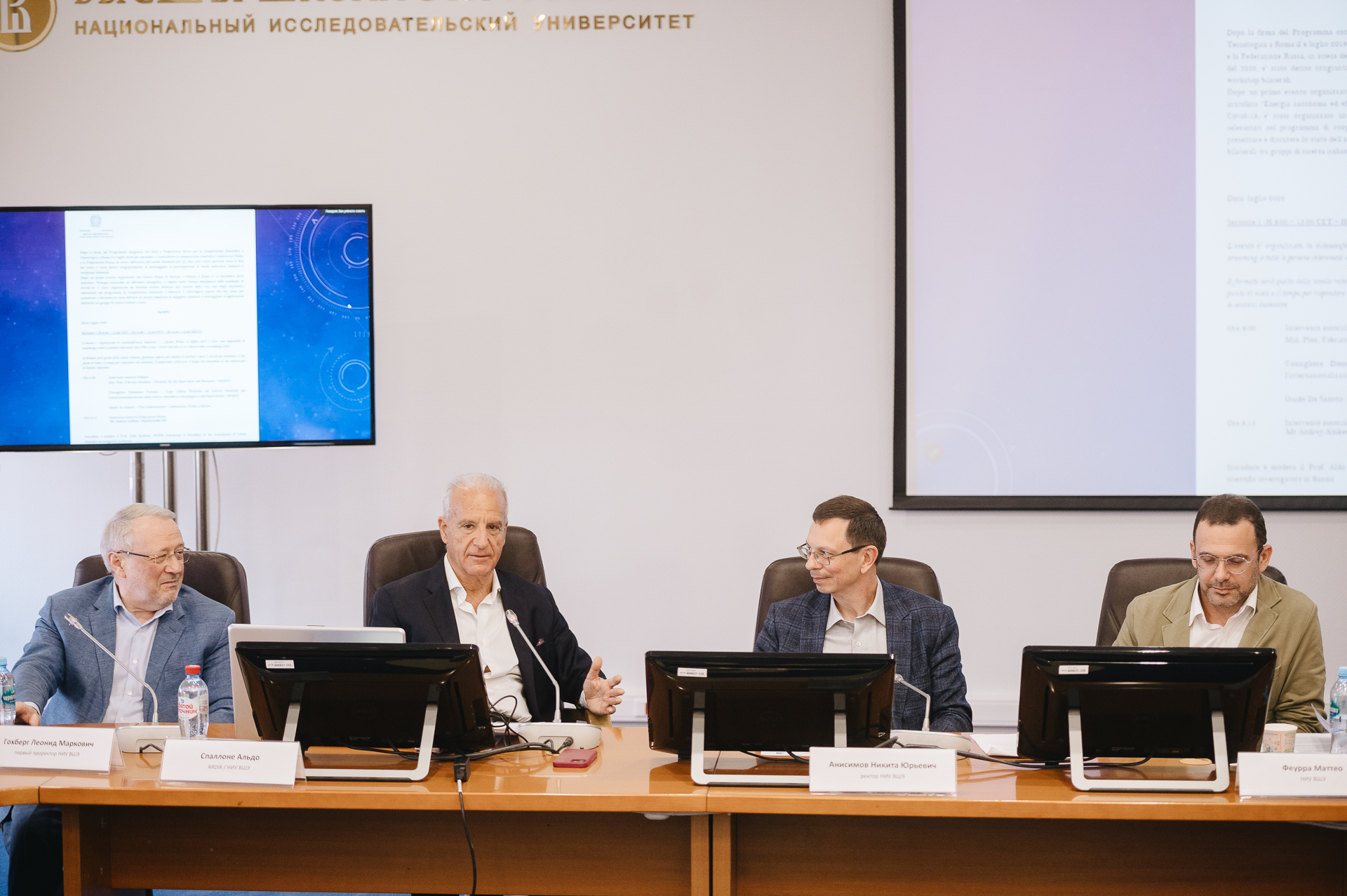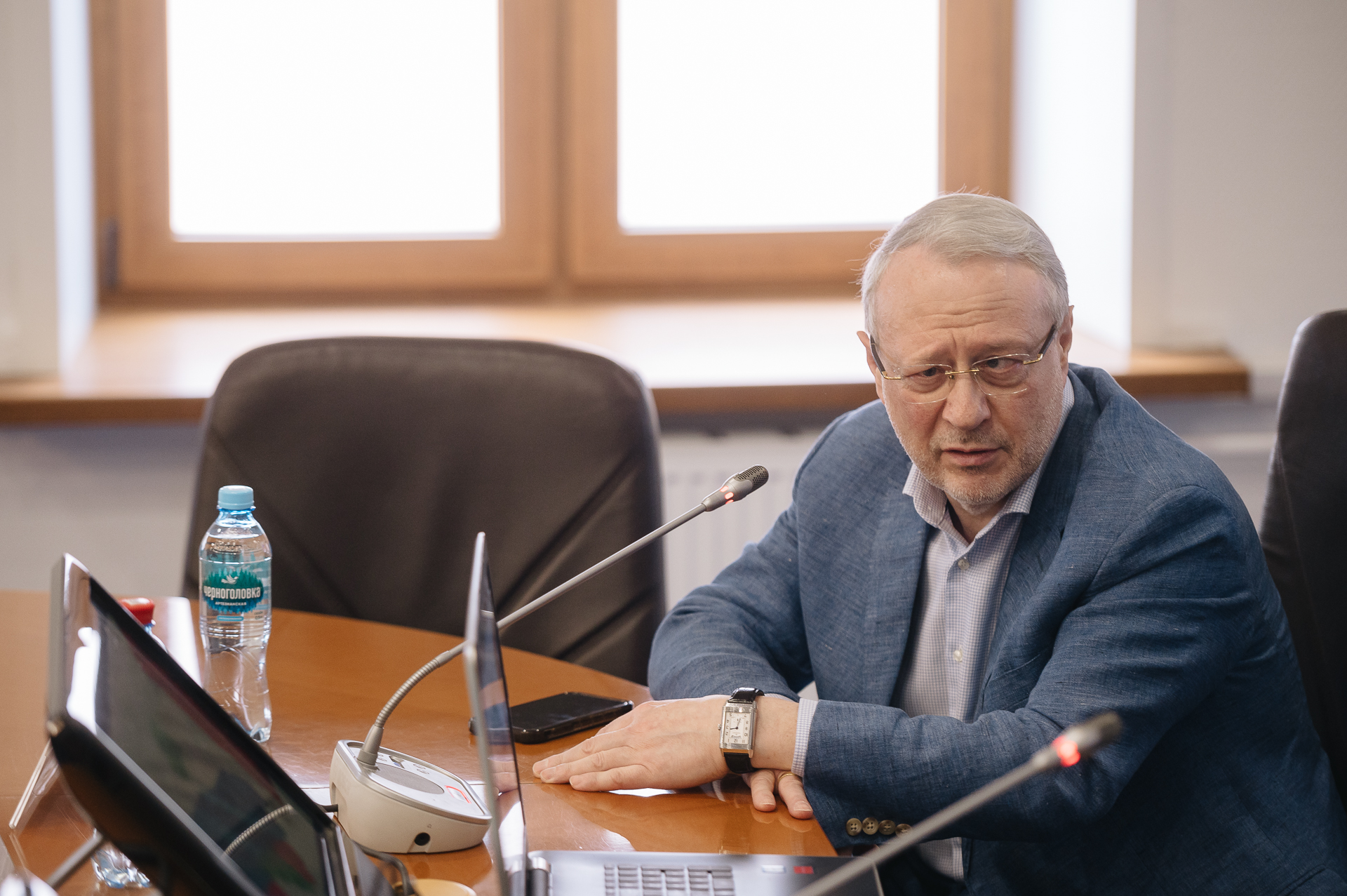Russian-Italian Projects in Biomedicine Discussed at HSE University
HSE University hosted an international mini-conference titled 'Search for new ways to develop Russian-Italian cooperation in the field of Biomedicine,' attended by scientists from both countries and HSE Rector Nikita Anisimov.
The international mini-conference ‘Search for new ways to develop Russian-Italian cooperation in the field of Biomedicine’ was co-organised by the Centre for Cognition and Decision Making of the HSE Institute for Cognitive Neuroscience and the Association of Italian Associate Professors in Russia (ARDIR). The conference was supported by the HSE Basic Research Programme and the Strategic Project 'Human Brain Resilience: Neurocognitive Technologies for Adaptation, Learning, Development and Rehabilitation in a Changing Environment' (ongoing in the framework of the Priority 2030 programme).
HSE University is open to cooperation with any international institutions, emphasised HSE Rector Nikita Anisimov in his opening remarks. 'We extend our invitation to prominent researchers, including early-career scientists from various countries. We can offer numerous opportunities for international cooperation, including “Human Brain Resilience,” a strategic project focused on neurocognitive technologies for adaptation, training, development, and rehabilitation, and implemented in the framework of Russia's Priority 2030 academic leadership programme. Today's event marks yet another step demonstrating our commitment to development, innovation, and collaboration,' he said.
Aldo Spallone, Research Fellow at the International Laboratory of Bioinformatics of the AI and Digital Science Institute, HSE University, spoke about the Association of Italian Associate Professors in Russia (ARDIR). The Association was established in 2020 upon the recommendation of the Italian Foreign Ministry and has had a positive impact on the relations between the two countries in the field of science.

Since the establishment of the Association, numerous prospective participants have shown interest in the opportunity to grow and develop alongside their Russian colleagues. This created a strong international connection, enabling scientists from both countries to share knowledge and expertise. Recent geopolitical events have caused many participants to take a break and reconsider their involvement in the organisation until better times. At the moment, we wish to inform all colleagues who are currently in Russia and carry out their work here that following a meeting with the Russian Ambassador to Italy (Alexey Paramonov - ed.), the Association will have the Russian authorities' support, allowing for more relevant cooperation with the world of science and higher education in Russia,' Aldo Spallone said.
HSE University positions itself as a global institution open to international scientific cooperation, stressed First Vice Rector Leonid Gokhberg. He noted, 'We are pleased that the Association has chosen our venue for today's seminar, and we look forward to continuing discussions here on our premises.'

The Russian-Italian conference continued with reports and presentations from participants. Anna Shestakova, Director of the HSE Institute for Cognitive Neuroscience, reported on the productive cooperation with Italian colleagues and also shared some of the results of her institute's work. As an example, she cited a recent study looking at how the choice of a foreign language can influence the learner's cognitive abilities. It has been found that languages dissimilar to one's native language stimulate cognitive function at the initial stage of learning, whereas those similar to the native language have a delayed effect, helping the learner's brain perform better once a higher level of foreign language proficiency has been achieved.
Matteo Feurra, Leading Research Fellow at the Institute for Cognitive Neuroscience, presented the project 'Improving Cognitive and Motor Function through Non-invasive Brain Stimulation.' The project involves Italian graduates of the Institute who continue their careers as scientists at HSE University.
Olga Buivolova, Research Fellow at the HSE Centre for Language and Brain, spoke about the activities of the Centre led by Professor Olga Dragoy. The areas of work carried out by the International Laboratory of Bioinformatics of the Institute of Artificial Intelligence and Digital Sciences were presented by Maria Poptsova, Head of the Laboratory. Ksenia Panidi, Senior Research Fellow at the Centre for Cognition and Decision Making, contributed to the discussion by highlighting the use of transcranial magnetic stimulation (TMS) in neuroeconomics research.
Prof. Jubin Abutalebi, MD, PhD, at the Centre for Neurolinguistics and Psycholinguistics (CNPL) of San Raffaele University, Italy, spoke about language control and about cooperation between Moscow and Milan.
Following the event, a round table was held to discuss the prospects for developing joint scientific projects involving scientists from both countries.
See also:
Five Strategies for the Future: Key Achievements of HSE Strategic Projects in 2024
During the past year, scientists at HSE University have worked on five strategic projects aimed at advancing key areas essential to the development of modern individuals and society. Each of these projects is unique, yet they share common goals: creating innovative product solutions, generating fresh ideas for the economy, social sector, science, and education, and contributing to the university's research potential.
Humans, Bots, and Digital Twins: Year-End Results of the Strategic Project 'Human Brain Resilience'
HSE University hosted a joint research seminar to review the 2024 results of the Strategic Project 'Human Brain Resilience: Neurocognitive Technologies for Adaptation, Learning, Development and Rehabilitation in a Changing Environment.' The event showcased the progress and outcomes of fundamental and applied projects focused on developing technologies for neurodiagnostics, neuroadaptation, and neurorehabilitation—collectively known as 3N technologies. The objective is to develop tools that can help prevent neurogenic and psychiatric disorders or alleviate their consequences.
HSE and Integration Education Centre to Develop New Programmes for Agrobiotech Advancement
HSE University and ANO Integration plan to jointly develop projects aimed at creating new approaches to education and advancing innovative agrobiotechnologies. The parties signed the corresponding agreement at the XI Congress ‘Innovative Practice: Science Plus Business.’
Virtual Mozart, Venture Capital Bot, and Educational Video Generation: How AI is Used at HSE University
In mid-November, HSE University hosted a meetup where faculty, researchers, and administrators presented their projects and shared experiences with using AI technologies in education and research. The meeting was part of the continuing professional development programme 'Artificial Intelligence in Education and Research.'
HSE Scientists Propose Using Heart Rate Analysis to Diagnose Anxiety and Depression
A group of scientists at HSE University have discovered how anxiety and depression can be diagnosed by analysing heart rate. It turns out that under mental stress, the heart rate of individuals with a predisposition to mental health disorders differs from that of healthy individuals, especially when performing more complex tasks. These changes in cardiovascular parameters can even be detected using a pulse oximeter or a smartwatch. The study findings have been published in Frontiers in Psychiatry.
Narcissistic and Workaholic Leaders Guide Young Firms to Success
Scientists at HSE University—St. Petersburg studied how the founder's personal characteristics impact a young firm's performance. It turns out that a narcissist and workaholic who also fosters innovation will effectively grow their company. The paper has been published in IEEE Transactions on Engineering Management.
Exploring Research Prospects and Collaboration Opportunities: Discussion of Strategic Projects Held at HSE University
On June 26 and 27, HSE University at Pokrovka hosted a discussion of potential partnerships between the university's research teams and strategic projects under the Priority 2030 programme. During the two-day session, the heads of strategic projects presented the main areas of their ongoing research, highlighted some of the key results achieved, and shared their vision for involving new researchers in the projects.
Keep Your Eyes On: A Prospective Device for Self-Monitoring Vision
As part of the Strategic Project 'Success and Self-Sustainability of the Individual in a Changing World,' scientists at HSE University have conducted a study to develop an electronic device designed to reduce the risk of occurrence and progression of eye diseases.
HSE University and National Academy of Sciences of Kazakhstan Agree on Cooperation
In early February, HSE University's campus on Pokrovsky Bulvar hosted a meeting between HSE Vice Rector Victoria Panova and Abay Serikkanov, Vice President of the National Academy of Sciences of the Republic of Kazakhstan. The parties explored potential areas of cooperation and concluded the meeting by signing a memorandum of intent.
HSE University among Top Universities in Digital Economy
HSE University took second place in the new 2023 ranking of universities in the digital economy in Moscow and St Petersburg, having lost only to Bauman Moscow State Technical University. HSE University outperformed specialised IT universities such as Moscow Institute of Physics and Technology (third place) and ITMO University (fifth place), as well as Moscow State University (fourth place).


